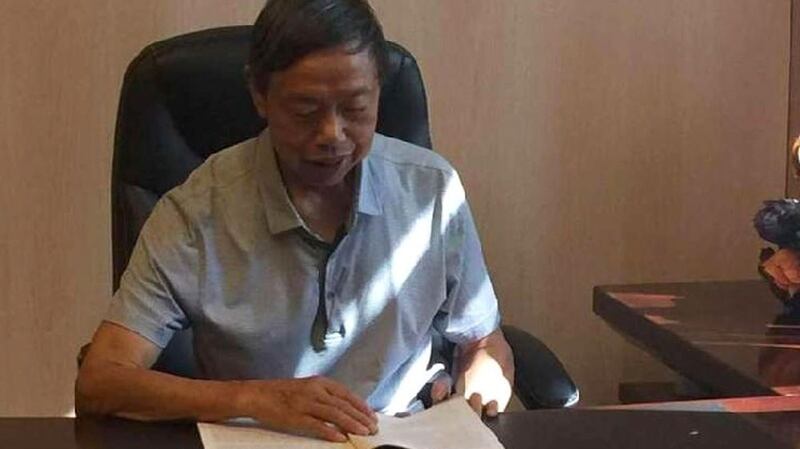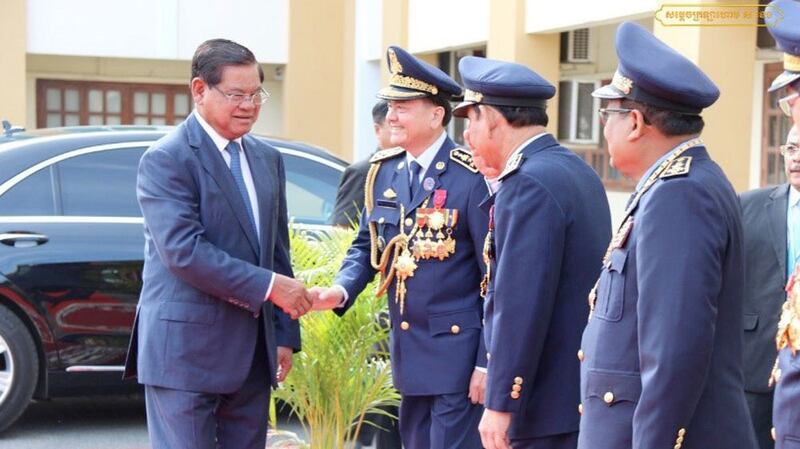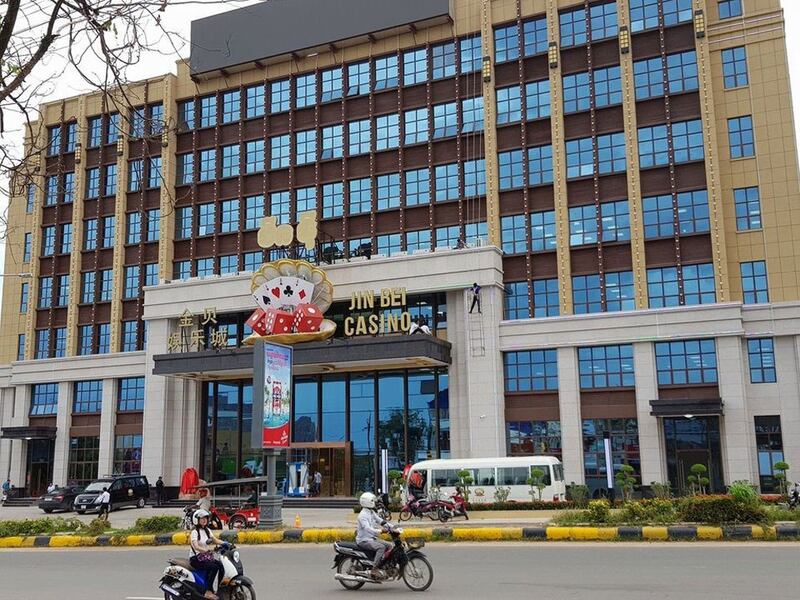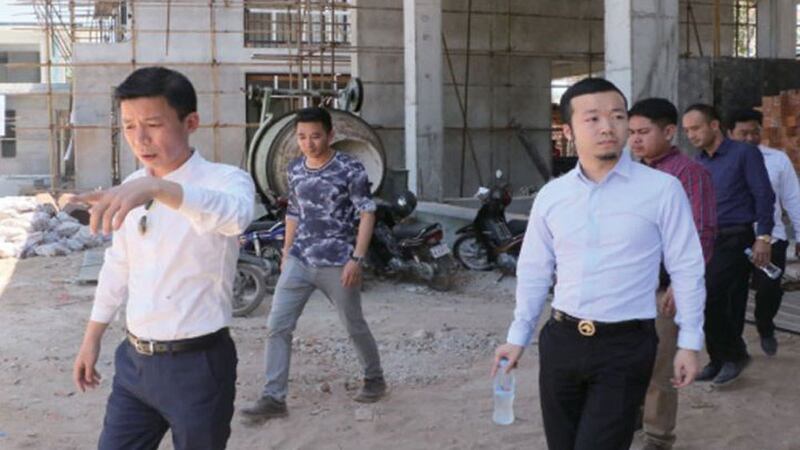A mysterious Chinese-Cambodian tycoon with ties to Interior Minister Sar Kheng purchased Cypriot citizenship in 2018, according to documents shared exclusively with Radio Free Asia by Al Jazeera as part of their Cyprus Papers investigation.
With a goatee beard and an impish demeanor, 33-year-old Chen Zhi makes for an unlikely “oknha,” the honorific title bestowed on businessmen who donate at least $500,000 to public works approved by the ruling Cambodian People’s Party.
Such sums are pocket change to the likes of Chen, one of a growing class of tycoons capitalizing on China’s Belt and Road Initiative, or BRI, which aims to improve commercial infrastructure linking China with the rest of the world.
Chen’s Prince Group of companies have invested more than $1 billion into corporate ventures across Cambodia, according to media reports. Evidence uncovered by RFA suggests he’s leveraged political connections in both Cambodia and his native China to make that happen.
Originally hailing from the Chinese city of Fujian, Chen became a naturalised Cambodian citizen in February 2014. The timing was perfect. Just five months earlier, Chinese President Xi Jinping had launched BRI, which unleashed a flood of Chinese capital into Cambodia, inflating a real estate bubble that has yet to burst.
A powerful friend in the shadows
Foreigners constitute the vast majority of buyers for condo units in the high-rises that have sprouted in Cambodian cities – many of them Chinese. While non-citizens are forbidden by law from buying land in Cambodia, Chen’s naturalized status means that his Prince Real Estate (Cambodia) Group has been able to make a fortune building and selling such units.
Evidence uncovered by RFA suggests Chen had a powerful silent partner in China involved the venture.
Marketing materials used by Prince Real Estate when it first set up shop in Cambodia point to a now-mothballed website that promoted its real estate offerings in the country from 2015 to 2018.
Archived versions of the site show in the bottom-left hand corner an Internet Content Provider, or ICP, license number. (Any website wishing to operate within China is required under Chinese law to apply for a unique ICP number from the Ministry of Industry and Information Technology or else find themselves blocked).
A search of the ministry’s official database revealed that the Prince Group’s domain name and ICP number matched. However, the database recorded them as having been registered by Chongqing Qijiang District Julong Industry, a construction and real estate company owned by Zhao Mozhang, a municipal official in the western Chinese metropolis of Chongqing.
A Phnom Penh proxy?
Born in 1943 and an engineer by training, local press reports describe Zhao as having made his fortune after communist China eased restrictions on private business from the late 1970s. He was reportedly selected for a local People’s Congress in 1990 and has maintained parallel careers in construction, real estate and politics ever since.
In March 2014, a Chinese real estate company wholly owned by Zhao became a founding partner in a newly formed Chinese firm: Chongqing Phnom Penh Trading Company.
The new company’s name seems to imply Zhao was eyeing business opportunities in Cambodia’s capital. The management of his shareholding in it through his pre-existing real estate firm suggests it was bricks and mortar he was interested in.

But without Cambodian citizenship, Zhao would be unable to buy land there. China’s laws prohibit its citizens from holding dual nationality. While the legislation is sometimes loosely enforced, it is unlikely an elected official like Zhao taking a second citizenship would go unnoticed.
Conveniently, Chen was awarded Cambodian citizenship less than one month before Zhao’s real estate company became a founding partner in Chongqing Phnom Penh Trading Company.
Chen did not respond to a detailed request for comment, including questions about the nature of the relationship between the Prince group of companies and those of Zhao, who reporters were also unable to reach for comment.
Joining the Cambodian elite
Chen certainly enjoys high-level political connections in Cambodia. In July, King Norodom Sihamoni designated him “neak oknha,” an honorific political scientists say indicates a track record of extensive generosity towards the ruling CPP.
Chen was subsequently appointed personal advisor to Cambodian Interior Minister Sar Kheng, for whose ministry he has already served as an unsalaried advisor since February 2017 -- a position with equal status to an undersecretary of state.

Chen’s association with Sar Kheng extends to business ties his son, Sar Sokha. Two weeks after Chen’s appointment as a ministerial advisor in 2017, Chen and Sar Sokha established Jinbei (Cambodia) Investment. While the company’s precise activities are unclear, it is likely connected to Chen’s Jin Bei Group, which owns a casino in the Cambodian resort city of Sihanoukville, a magnet for Chinese gamblers.
Sar Sokha, who did not respond to a request for comment, is also a secretary of state at the Ministry of Education. But that didn’t stop him participating in a showy Prince Real Estate public relations exercise in Sihanoukville in April 2017.
For many years, Sar Kheng has been widely perceived as a moderate, reformist alternative to Prime Minister Hun Sen. According to Sebastian Strangio, author of “Hun Sen’s Cambodia,” the overlapping of the political and business links between Chen and the Interior Minister undermine this narrative.
“It shows that he continues to play the same sort of patronage politics that Hun Sen does in a similar sort of way,” Strangio told RFA. “I think this is evidence of just that.”

Following the Khmer Riche to Cyprus
In early 2018, Sar Sokha divested his shares in Jinbei (Cambodia) Investment, according to Cambodian Ministry of Commerce records. Meanwhile, Chen had been busy procuring one of the ultimate status symbols among Cambodia’s political and business elite: a Cypriot passport, which allows ease of travel and doing business across the European Union.
Over the last year, the government of Cyprus has come under increasing pressure from opposition lawmakers, NGOs and the European Commission to reform its highly lucrative citizenship-by-investment scheme. Under the scheme, persons wishing to obtain a Cyprus passport are required to invest $2.5 million in businesses or real estate on the island nation.
A Reuters investigation last November revealed that more than a dozen politically connected Cambodians had obtained Cypriot passports through the scheme. The government in Nicosia reacted by announcing that it would revoke the citizenship of eight of those Cambodian-Cypriots, although they would have to rewrite the scheme’s legislation to do so. Today, almost a year later, the eight are yet to lose their passports.
As previously reported by RFA, they include National Police Commissioner Neth Savoeun, who in January 2018 joined Chen at a ceremony to mark a donation by the Prince Group of 13 transport trucks to the Cambodian police.
This August, another damning leak of documents from the scheme was made available to Al Jazeera. Dubbed the Cyprus Papers, they contained details of 2,500 people who had paid for a Cypriot passport.
Documents shared with RFA by Al Jazeera reveal that Chen Zhi was among those 2,500. His application, submitted in 2017, was approved by the Cyprus Ministry of Interior in May 2018.

Mystery millions
Neither Chen nor the Cyprus Ministry of Interior official who signed off on his citizenship application responded to questions about what investments the young Chinese-Cambodian-Cypriot made in order to obtain his latest passport.
A similar shroud of mystery hangs over much of the oknha’s wealth. He is listed as a director of 10 Hong Kong companies. In many of those cases he is the sole listed director and the companies’ shares are held by shell companies in offshore secrecy jurisdictions such as the British Virgin Islands, making it impossible to know who truly owns the Hong Kong firms.
So where exactly Chen’s money came from is unclear – as is how he transformed from a 27-year-old nobody into one of Cambodia’s most successful tycoons in just six years.
One thing is clear, however: whether in China or Cambodia, Chen has not been shy of cosying up to the politically connected – a quality that has brought commercial success for many Cambodian tycoons before him.
RFA's Mandarin Service contributed to this report.
